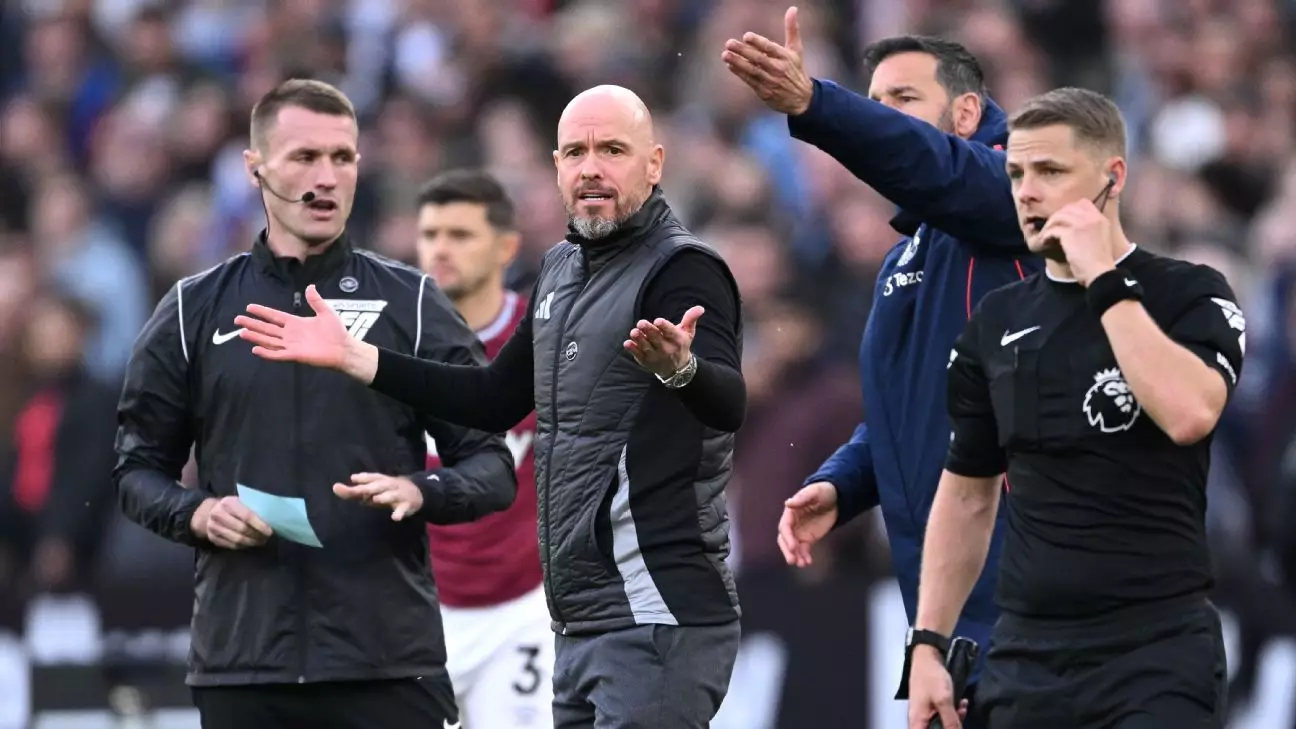In a tumultuous season that seems far from the glory days of Manchester United, manager Erik ten Hag finds himself grappling with challenges that go beyond just defeating rapidly improving opponents. The recent 2-1 loss to West Ham United further underscores the team’s ongoing crisis, characterized by inconsistent performances, poor finishing, and controversies surrounding officiating. While Ten Hag strives to maintain his composure, his upbeat facade is crumbling under pressure as the red devils’ descent continues.
The match at the London Stadium was meant to represent a turning point, a chance to secure much-needed points. However, the reality was vastly different. Initially, Manchester United appeared capable of dictating the flow of the game, with Bruno Fernandes supplying crucial chances to teammates. Yet, in a matter of moments, the narrative shifted dramatically. A late penalty awarded to West Ham after Matthijs de Ligt’s foul on Danny Ings proved to be the turning point. Jarrod Bowen’s decisive kick not only sealed the match but showcased United’s inherent vulnerabilities in high-stakes situations.
One of the starkest revelations in this defeat was the inability of Manchester United to adapt when the tide turned against them. From a commanding position, the team allowed West Ham to dictate the later stages of the match. The lack of defensive resilience and inability to regain control is a recurring theme that Ten Hag must address urgently. The irony lies in a Manchester United side that once thrived on fierce resilience now being unable to weather the pressures of a competitive game.
Even more alarming is the evident disconnection between the players’ performances and Ten Hag’s tactical vision. His assertion that football is not always about who plays better seems both a dismissal of responsibility and a sign of deeper issues within the squad. With the manager opting to downplay the potency of tactical execution, one cannot help but wonder if the same argument will apply when the players fail to deliver yet again. The triple substitution made by West Ham’s Julen Lopetegui at halftime proved decisive; a masterstroke that contrasted sharply with Ten Hag’s inability to make similarly impactful substitutes.
The dismal offensive output highlighted a growing concern: Manchester United’s players, typically renowned for their creativity and goal-scoring ability, are struggling to finish even the most straightforward chances. Diogo Dalot’s inexplicable miss during the match elicited an awed mix of embarrassment and frustration, symbolizing the broader issues of lack of finishing that plague the team. Alejandro Garnacho has shown flashes of promise, but with only 20 goals and 13 assists in 100 appearances, it’s evident that consistency in output must be prioritized.
Moreover, players like Marcus Rashford, long considered a linchpin of the attack, demonstrate a markedly better return, yet still remain under scrutiny due to underwhelming performances when stakes are high. As Ten Hag lamented the missed opportunities and a lack of cutting edge, one must question whether the players are equipped to execute his game plan while also understanding their roles in critical match situations.
While it’s easy to gauge Ten Hag’s visible frustration from the touchline, the managerial decisions he makes—be it substitutions, formations, or strategic adjustments—have become critical in shaping match outcomes. The penalties assigned for defensive lapses and the bizarre VAR decisions have not helped; however, self-reflection is essential. Acknowledging and learning from the defeats rather than hiding behind external factors like refereeing decisions is paramount if the team hopes to improve.
Looking ahead, Manchester United’s schedule does present opportunities against teams that are currently battling lower in the league table. Games against Chelsea, Leicester City, Ipswich Town, and Everton could either serve as a critical reclaiming of form or a continuation of disappointment. The specter of too many missed chances must be exorcized if fortunes are to change—an uphill battle that Ten Hag must embrace fully as manager to shift the course of what has become a disappointing campaign.
The current state of Manchester United, under the guidance of Erik ten Hag, is filled with room for improvement. As the echoes of “United is back” seem distant, the urgent need for tactical acumen, mental resilience, and clinical finishing rises to the forefront. For any hopes of redemption, the team must realize that the journey to recovery will neither be effortless nor devoid of challenges.

